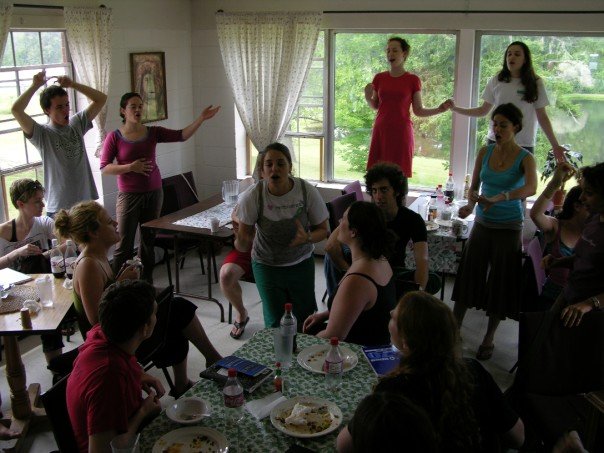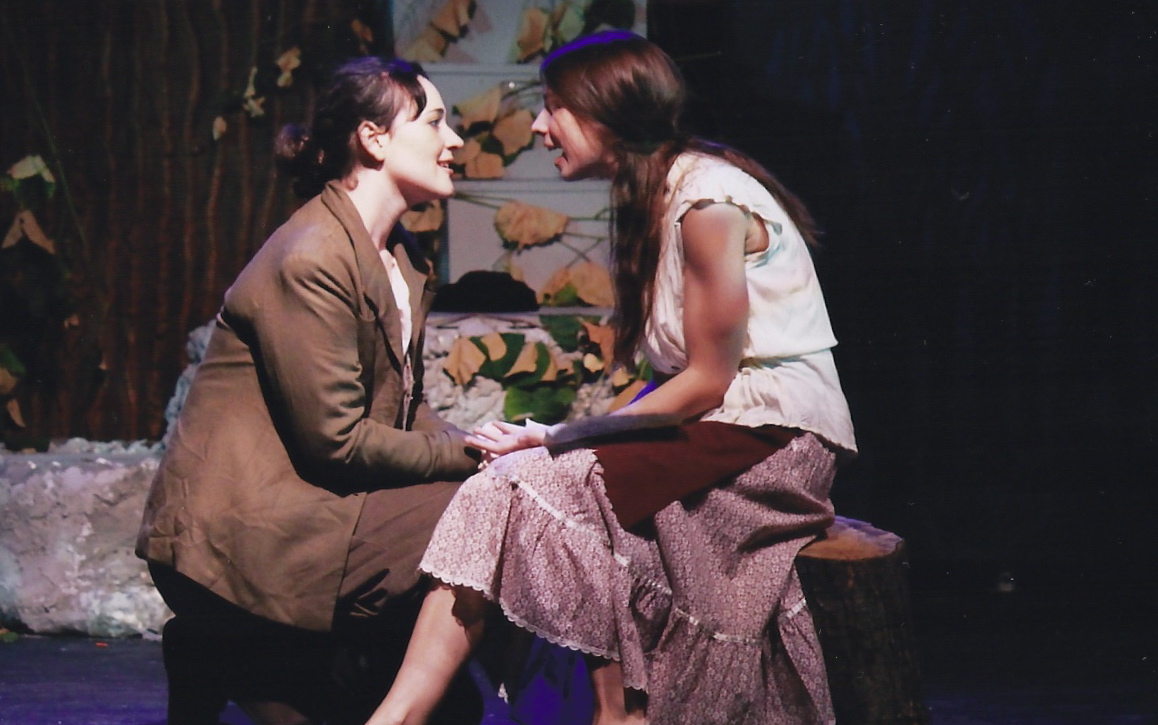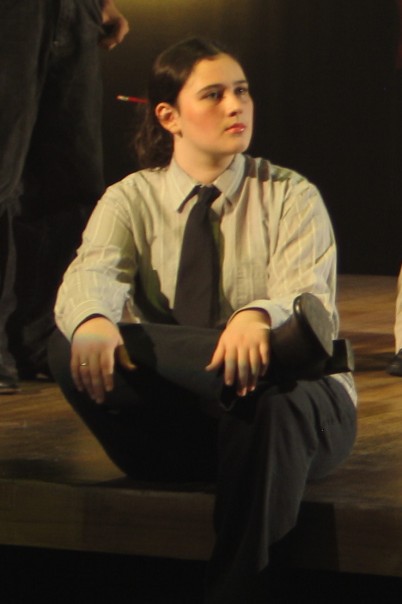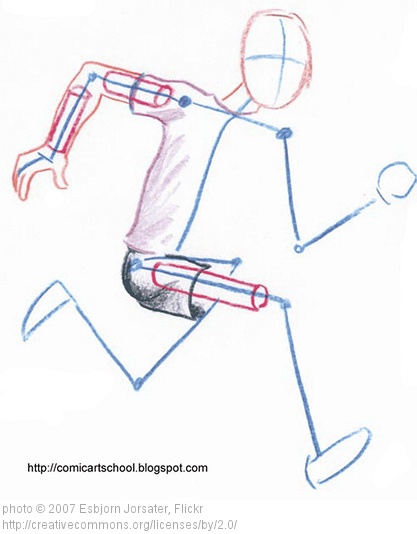The storm rages outside and I have yet to give my dramatic rendition of Lear’s Storm speech so… watch this and forgive me… (I couldn’t do it the justice that Sir Ian does it anyway).
I did, however, get to bring my own storm to light yesterday. In an effort to send the cast of Measure for Measure off to the ball in style, myself and the assistant director ran a three-hour text workshop designed to give the actors some tools in their arsenal with which to tackle Shakespeare’s text.
The cast is rather large since the director really wants to capture the feel of a bustling metropolis. This is both extremely exciting and slightly daunting; with that many bodies the text workshop was going to be whatever the cast made of it. That much energy buzzing around could bolster itself or tear itself down depending upon the level of focus in the room. Luckily, the actors were receptive, came willing to learn, and (most importantly) willing to play.
We began with some standard warm-ups (stretching, vocalization, etc.) and proceeded

- Sometimes actor training looks like this; Royal Shakespeare Company; Summer 2006
into an exercise designed to help them simultaneously embody the text and give/take energy. They each picked a line at random out of an envelop of pre-prepared lines, and we divided them into two circles of eleven. From there, we had them pass a ball around their circle while saying their line. We got to play with tempo, volume, targeting, and work on the beginnings of ensemble-building. I find that this exercise presents a graphic stimulus for energy exchange and demonstrates to a group of actors what it means to match energy and help your scene partner onstage. If you throw the ball too hard, your partner has trouble catching it. Too soft, and it will fall short. You need to be ready to grab and go, and listening to what’s going on so that you know when you need to go.
This point made, we moved on to a head/guts/groin exercise where the students practiced delivering their lines with different intentions to different targets on a partner. The three primary targets are the head (an appeal to the intellect), the guts (an appeal to the emotions), and groin (an appeal to the primal animal portion of ourselves). We had them do this at varying distances; from close enough to touch to across a broad expanse of the room. This exercise teaches focus and helps a young actor get used to the notion that no line should ever be delivered to dead air or left wandering into the vast nothingness of the theatre. Every single bit of text needs a very specific target and intention; whether that target is onstage or off.
Next, we talked about some mechanical things. Scansion, meter, rhyme, verse structure, poetry v. prose, etc. This was perhaps the most difficult portion to teach as it requires the most lecturing and, in a room where the energy is already buzzing from being up and about for so long, it’s hard to focus down on something so academic (even for a brief time). The actors were champs though and really bit into this section, asked some good questions, and worked with me to ensure that they understood what I was preaching.
Lastly, we turned to some speeches we had asked them to pre-prepare (not memorize, just be familiar with and have on hand). Here, they were able to take what we had discussed and discovered and apply it in a setting where they could take risks, ask questions, and try things without being set in any one choice since the speeches were sample text and not necessarily text which belonged to their characters. Everyone got a chance to play and seeing what they turned up (and what they understood from each other) helped to drive home the work we had done over the course of the evening.
The most important thing to do during workshops like this is to keep the energy moving. The workshop leader always needs to have a finger on the pulse of the room; understand when your students are tired and know how to give them a break without letting the bottom drop out of your thought progression. Know where you need to go slowly so that the students have time to think and process. If you can possibly integrate some kind of exercise to drive a point home, do that.
There are three basic types of learning: audio, visual, and kinesthetic. Most people learn via a combination of the three. If you can find a way to appeal to all these learning types simultaneously, your point has a higher likelihood of sticking. In addition, while a picture may be worth a thousand words, an experience is worth ten thousand. Let the students feel what it’s like to succeed using your methods. With this experience banked, they are much more likely to a) want to do what you’ve asked them to do, b) learn more methods from you since the first one worked so well, and c) listen to what you have to say in general. There’s nothing like proving you’re right to make a group of people believe in your wisdom.
One of the things I’ve always admired about good acting teachers (and directors, for that matter) is that they almost seem omniscient. There’s a way about a good acting teacher that pierces deep down to your very soul and uncovers insecurities that you could never before put into words. They have, somehow, the ability to weed out the things that make you weak as an actor (and human being) so that your true strength shines through.

Sometimes actor training looks like this; Shakespeare & Company; Summer 2007.
It’s also what I’ve always found so intimidating about teaching acting. While I know a lot and have a lot of experience (and, by the way, an abundance of modesty), I’m hardly omniscient. I’ve had many great acting teachers and coaches find a way into the deepest recesses of my soul and it’s changed me not just as an actor, but a human being. How can I possibly hope to assert myself amongst the ranks of people who have near-godlike powers of observation at their disposal?
As I found out yesterday, the years have given me the wisdom to teach, and the confidence to command a room. I felt really good walking out of workshop, and I think it was extremely useful to the cast to have that experience. I am looking forward to working on Measure and definitely looking forward to what this cast churns out. They’ve got some acting chops, let’s see if they can bring this work to bear on some pretty difficult and problematic text.






 the gym, a great way to kick one’s own buttocks, and a great way to sleep better at night. In an effort to push my cardio to the next level, I started
the gym, a great way to kick one’s own buttocks, and a great way to sleep better at night. In an effort to push my cardio to the next level, I started 